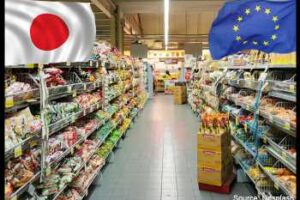EU Lifts Restrictions On Food Imports From Japan

The European Union has lifted the import restrictions it imposed on food items from Japan following the nuclear accident at Fukushima.
Announcing the decision at the EU-Japan Summit in Brussels, European Commission President Ursula von der Leyen said that the Commission is lifting the import restrictions on the basis of positive results from controls done on the products by the Japanese authorities and the Member States.
Speaking at a post-summit news conference, von der Leyen said the Commission took this decision based on science, evidence and the assessment of the International Atomic Energy Agency. “And we also agreed to solve several other trade issues in the course of this year, in particular the access for our agricultural products to the Japanese market”.
Shortly after the meltdown at Fukushima Daiichi nuclear plant in 2011, the EU took measures to protect human health against possible radioactive contamination from food and feed imported from Japan and imposed thorough pre-export testing of food products for radioactivity.
The last review took place in September 2021 and limited the import restrictions to wild mushrooms, some fish species and wild edible plants.
Although the restrictions have been fully lifted, the EU made it clear that the Japanese government should continue to monitor domestic production for radioactivity. This includes in particular fish, fishery products and seaweed close to the release site of the contaminated cooling water.
Japanese Prime Minister Kishida Fumio and European Council President Charles Michel also attended the joint press conference with von der Leyen.
Japan is still in the blacklist of many countries for importing produce from Fukushima and other parts of the country.
Japan is set to release tens of thousands tons of treated nuclear waste water from the destroyed Fukushima power plant into the Pacific ocean after it recently got permission from The International Atomic Energy.
Source: Read Full Article
